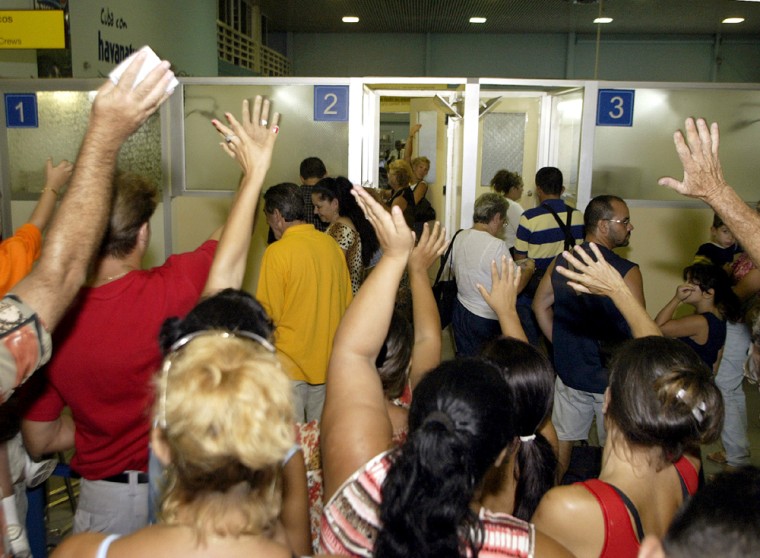Florida’s Cuban Americans appear to be sending a new message to the White House — get tough on Fidel Castro and not our families.
A new poll of Florida Cubans indicates that the president’s new regulations curtailing family travel and remittances back home could cost the Republican ticket some crucial votes this November.
Released Friday the poll showed a 16-point slip for President Bush even though he maintains an comfortable lead over his presumptive Democratic rival, Sen. John Kerry.
“Regardless of anyone's position vis à-vis current U.S. policy towards Cuba, family comes first and these new measures divide the integrity of the family,” said Sylvia Wilhelm whose group, the Cuban American Commission for Family Rights, sponsored the poll and opposes the administration’s new anti-Castro strategy.
If the election were held today, 66 percent of the respondents said they would vote for Bush, down from the 82 percent who voted for him in 2000.
Older Cuban Americans seem to respond better to the president than younger voters. Almost 80 percent of Cuban Americans 50 years of age or older think the president is doing an excellent or good job compared to a little over 60 percent in the 18-49 age group.
That same split emerged on the new regulations. Those over-50 overwhelmingly support the cuts in family travel and remittances while those under-50 strongly oppose the new measures.
New restrictions being felt
The new measures went into effect June 30 and caused emotional angst on both sides of the Florida Straits by placing restrictions on family contacts.
By presidential edict, Cuban Americans can only travel home once every three years and just for 14 days to visit immediate family. Aunts, uncles and cousins no longer count as immediate family.
People may only send $100 a month home and just to parents, spouses or children -- again excluding help to cousins, aunts or uncles.
Complicating matters, exiles cannot travel without a special U.S. government travel permit.
Lastly, Bush abolished all humanitarian travel requests, used in the majority of cases to attend a funeral or visit a dying relative.
That particular decision infuriated many in the Cuban American community. They were especially angered by comments from Daniel Fisk, a deputy assistant secretary at the U.S. State Department.
He told the media, "An individual can decide when they want to travel once every three years and the decision is up to them. So if they have a dying relative, they have to figure out when they want to travel."
Cracking down on money pouring into Castro’s Cuba
As luck would have it, the crackdown came at a time when the Castro government loosened its own visa requirements to court growing numbers of Cubans living abroad and to bring in more hard currency revenues.
That dollar lifeline props up the Castro regime and must be severed, argued top State Department official Roger Noriega in a recent interview with NBC Dateline’s Keith Morrison.
“Castro clings to power by virtue of using his people as an export — as cash cows to shovel money back to the regime.”
Counting family remittances and travel earnings, that figure could surpass $1 billion.
One sector here is already reeling from the new measures — Havana airport workers are losing dollar perks as U.S. travel dries up.
Luz Maria Hernandez supports two teenagers and her elderly parents on a bookkeeper’s salary and her share of tips collected at the airport's food stands.
“I tally the sales and Terminal Two has hit rock bottom,” explained Hernandez. That terminal is used exclusively for the Miami, New York and Los Angeles charter flights.
Her parents happen to be in south Florida visiting her sister and due to return home in September. “I’m urging them to stay there, permanently. Who knows if I will lose my job?”
Before June 30, Wilson Charter out of Miami had a bustling business, transporting some 800 passengers on seven flights a week to Havana.
“We're now sending 13 to 15 people a week,” said Aylin Martinez, a company representative. “The situation is not pretty.”
Making things worse, Martinez said, is the fact that none of her passengers are Cuban American.
The Treasury Department’s Office of Assets Control (OFAC), which enforces Washington’s 42-year old embargo on Cuba, did not begin accepting applications for the special Cuba travel license until last week.
“OFAC now says it will take at least 6 more weeks to process those requests," said Martinez. The delay translates into a virtual suspension of Cuban American travel.
In effect, Cuban Americans who had planned to spend their summer vacation visiting family will be back at work or school before OFAC finishes processing their paperwork.
Cuban American voting intentions
Yet, it's not clear if the restrictions will really make a difference in Florida when voters go the the polls in November.
The Commission for Family Rights survey showed that only half of Cuban Americans listed a candidate’s position on Cuba as “very important” in deciding their vote. The other half listed jobs and education as their top picks while a solid third gave the president a negative rating on Iraq, the economy and service to the Hispanic community.
Cuban-American voters, who traditionally support Republicans, constitute a significant bloc in the battleground state of Florida. Just 537 votes gave Bush the state in the last election.
In terms of the new policy Wilhelm believes, “Bush received bad counsel and he might pay dearly for it come Nov. 2.”
But displeasure with Bush, cautioned Wilhelm, does not automatically translate into votes for Kerry.
Far from a slam-dunk, with Election Day four months away, Kerry has only managed to attract 16 percent of the Florida respondents.
“Kerry has to inspire these Bush dissenters and new voters with a clear message on Cuba. It is not possible to simply lambaste the Castro government,” said Wilhelm.
